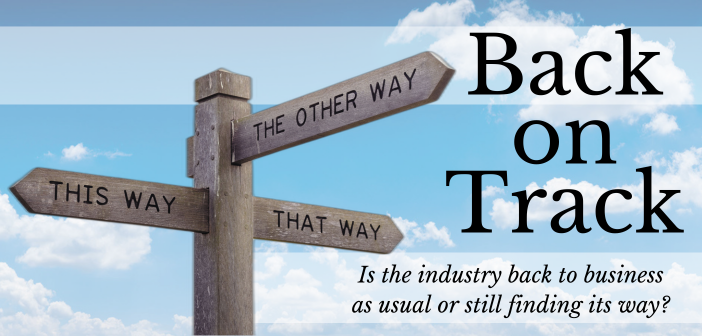Is the industry back to business as usual or still finding its way?
BACK ON TRACK? HARDLY. FRED DOMINIONI, chief revenue officer at Solonis, would say the hotel industry is “on a different track altogether.” “As an industry, we’ve inarguably been changed by the events of the last three years,” Dominioni said. “As a result, hoteliers are now tasked with approaching daily operations and guest experience through a different lens – one that’s low touch but high personalization.”
The recent season has brought significant shifts in how and where people spend their time and money. Expectations have changed in terms of desired experience, safety, value, social interaction, personalization and more. There once was talk of simply making it through on the way back to normal. Today, however, there’s an increasing awareness that “normal” won’t look anything like it once did.
Dominioni sees the industry increasingly leaning on technology, making “thoughtful investments that can allow staff to do more with less, increase daily efficiencies, and create better experiences for guests traveling in 2023.” Historically, he said, “hotels have been a tad slower to adopt technology because of the critical importance of face-to-face interaction, but the industry is beginning to see that luxury experiences and technology aren’t mutually exclusive. It’s quite the opposite.”

OLENA YAKOBCHUK/SHUTTERSTOCK.COM
The recovery of the industry, he said, comes down to the comfort level of the traveler. In late 2022, Solonis – which offers a cloud-based property management system built for the hotel industry – conducted consumer research to gauge travel sentiment and expectations.
“One trend we uncovered is that the willingness of today’s travelers to stay at hotels is completely nuanced and individualized,” Dominioni said. “While many guests are thrilled to be traveling again after such a long pandemic pause, no one-size-fits-all solution can make all people feel entirely comfortable traveling in today’s climate. Whether pandemic related or economic driven, data shows that people will cut back on travel if they feel uncertain.” It’s worth noting, however, that “by and large, our industry numbers are trending upward, and I believe there are many reasons to be hopeful about the future of hospitality.”
Amid this optimism, however, concerns about labor shortages loom large. The same report projects U.S. hotels to employ 2.09 million people in 2023, down from 2.35 million in 2019.
Umar Riaz, EY Americas real estate, hospitality, and construction consulting leader and EY Americas hospitality sector leader, wrote about the EY 2022 Hospitality CFO Survey in the company blog. The survey drew responses from CFOs at 20 leading travel and hospitality companies.
“When the pandemic hit in early 2020, the entire hotel industry basically shut down,” Riaz wrote. “Analysts predicted it could be 2023 or even 2024 before RevPAR (revenue per available room) would return to pre-pandemic levels. However, 16 of the 20 leading CFOs surveyed believe the industry will reach that benchmark by spring 2023.” Nine of those CFOs were even more optimistic, “predicting a return to 2019 levels by the end of 2022.”
In keeping with that thought, leisure travel continues to grow; corporate travel is on a slower return.
As for those labor shortages, 12 of the 20 CFOs in the EY survey cited the challenge as the leading strain on hotel net operating income. “More than half of the respondents in the survey said they are adjusting amenities to customers and outsourcing various functions to try to reduce costs,” Riaz wrote. “Hotels are also raising pay to attract talent, with 17 out of 20 CFOs surveyed claiming they plan to do this. More than half of the respondents are also relying on technology more than before to get things done and create more efficiencies.”
MINDFULNESS MATTERS
Kimberly Gore, national practice leader of HUB International’s hospitality specialty practice, extends kudos to the industry for being “so resilient and flexible,” and helping the general public feel comfortable about returning to travel.
At the same time, she notes the headwinds, including those staffing issues and rising costs. Hoteliers will want to ensure they can deliver the guest experience they desire to present – as well as the internal culture they hope to maintain.
Even if other parts of the industry are forging ahead, “the ability to attract people is still in recovery mode,” she said. The company touched on a number of these trends in its 2023 Hospitality Outlook report.
“There are a lot of hotels looking for people,” Gore said. “Good people have choices, so why do they choose to come on and to stay with you at your hotel?” Culture, feeling valued, and experiencing a sense of inclusion can be every bit as important as the pay scale. “And all of that rolls over to your guest experience,” Gore said. “If your employees are happy and engaged, the guest is going to feel that.”
One element is extending the idea of “personalization” to hotel staff. Employees are increasingly enjoying personalized benefits with the ability to choose what’s most important to them, she said. Staff can be at different life stages: Some will have young children. Others will be caring for elderly parents. Still others might have kids in college. But there’s no need for hoteliers to take on the costs of every option. In many cases, Gore said, employees don’t mind paying for voluntary benefits, especially if they receive group rates and discounts.
She also is seeing benefits extending to part-time employees, and an increase in options like frequency of pay (daily, weekly, etc.) as well as flexible and/or split schedules. Her company, she said, takes a holistic approach to helping create the right offerings.
In this season, Gore sees possible “quick wins” by taking advantage of technology – especially when it frees up staff to better take care of guests. But she also sees forward movement through an emphasis on employee safety, such as improved risk-management measures and training, and focused efforts to meet customer expectations of sustainability.
Dominioni sees re-evaluation of the property management system as both an easy win and the key to long-term property growth. That applies in four areas: guest experience, front desk operations, property oversight, and revenue management. But he, too, mentions sustainability. “In our recent survey,” he said, “65% of guests expressed positivity toward hotel sustainability efforts, yet only 30% of global room availability belongs to the Sustainable Hospitality Alliance. There’s a bit of a disconnect between what guests prioritize and look for and how the industry is responding – although that’s actively changing. As a starting point, hotels can respond in kind by reducing plastic waste, shifting away from keycard use, and making smart appliance choices.”
THE GREEN REVOLUTION
Binu Matthews, CEO of IDS Next, a provider of smart hotel software across Southeast Asia, the Middle East, Africa, and Oceania, wrote about the industry trends he sees for 2023, as well. In terms of sustainability, he noted that “green is a responsibility.”
Modern consumers, he wrote, “do not settle for greenwashing. Hoteliers have no choice but to satisfy contemporary guests who are sensitive to social responsibility and committed to sustainability. The CCS Insights Predictions report on sustainability predicts that by 2025, a new green certification will be displayed by websites using low-energy design and code, indicating to guests what brands genuinely commit to their sustainability goals.” He continued, “According to Abhijit Sunil, a senior analyst at Forrester Research, environmental sustainability is forecasted to be a strategic imperative for businesses in 2023. Being a part of this green revolution is not a marketing trick anymore, but a responsibility for hotels.”
Coming days, then, will continue to bring shifts in focus, streamlined objectives, strategic investments, and ongoing reminders that what worked in the past won’t necessarily work in the future. Even if past efforts did hold up, it wouldn’t be the case for every guest or every employee. Personalization will continue to be top of mind.
“Today’s consumers expect a heightened level of personalization in every brand interaction – whether with a hotel, restaurant, clothing store, or other business,” Dominioni said. “In today’s digital world, personalization is the only way to break through all the noise and other messages consumers receive. However, that level of personalization can only be achieved with data, time, and creativity, which many hotels don’t always have the bandwidth to deliver.”
As an industry, he said, “we have fewer people to manage the influx of travel interest and have to be smarter with allocating resources. I think that’s also why there’s so much emphasis on technology adoption in the hospitality space over the last couple of years: we’re trying to give staff the tools to do more with less.”




